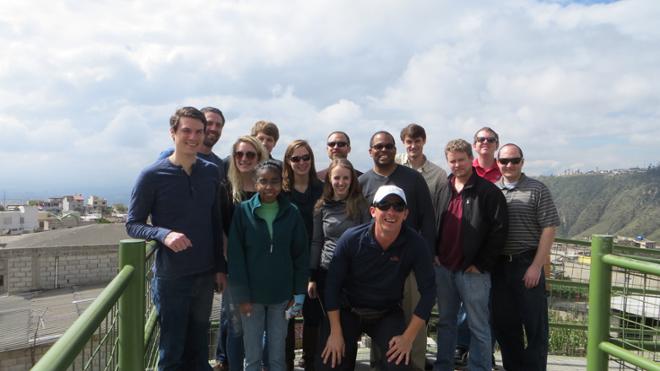International Residency in Ecuador
Quito, Ecuador sits roughly 9,400 feet above sea level in the Andean foothills of South America near the equator. Built atop an ancient Incan city, Quito boasts a rich, extensive cultural history and was declared a UNESCO World Heritage Site in the 1970s. Today, Ecuador is experiencing broad economic growth while remaining home to a thriving cultural tradition. In March, a group of Richmond MBA students traveled to Universidad San Francisco de Quito (USFQ) Business School to experience life and work in a rapidly changing economy in South America.
Thomas Cossé, associate dean for international business programs, gave insight into why Ecuador was chosen for the International Residency. “We chose Ecuador for a few reasons. Our partner school USFQ is located just outside Quito in Cumbayá, and it is considered one of the best schools in Ecuador. This presented a huge learning opportunity for The Richmond MBA students because it gives them an enriching international component to their Richmond MBA education. Ecuador is also a very interesting country in terms of its economy. Rafael Correa, president of Ecuador, has initiated measures that make it difficult to import products in an effort to develop the manufacturing sector in Ecuador. The students were able to see a somewhat closed economy and the changes that are taking place in Ecuador as a result. It’s a truly fascinating place.”
Laura Coleman, GB'16, assistant brand manager at Altria, shared, “I’d never traveled to South America before, and I hoped to gain a better understanding of the culture and how businesses are run compared to the U.S. When we arrived in Ecuador, we started off the journey immersing ourselves in the local culture. Our group traveled to volcanoes, local markets, the capital square and churches with a tour guide who shared many local stories and history. We also spent time on the USFQ campus participating in classes hosted by professors who shared information about Ecuador’s economy and industry.”
International Residency in Ecuador
Owen Alberti, GB'15 and L'15, who will begin working as a legal associate for Guggenheim Partners in the fall, explained, “Learning from our hosts at USFQ was a great experience. We received lectures from some of the foremost business minds in Ecuador and gained new perspectives on how business is viewed in the country, how the U.S. and Ecuador interact and what the future might hold for Ecuador. I learned most about how currency functions in the U.S. and in other countries and began to understand how important currency choices can be to a country like Ecuador.”
Fabrizio Noboa, director of USFQ Business School, shared, “Collaborating with The Richmond MBA has been a wonderful experience for USFQ Business School. The students have done an extraordinary job with the international consultancy projects (ICPs) provided by Ecuadorian firms. Last year one of the teams gave strategic recommendations to Aclimatic, a local provider of air conditioning solutions, which helped the firm enhance its position in its relevant market. This year the projects included firms in the oil industry, shoe manufacturing and radio-frequency identification (RFID) technology. They’re greatly looking forward to the projects’ outcomes.”
Coleman gained new insights into international business and culture through the ICP. “My group worked with a company that supplies materials for the drilling of oil wells in Ecuador. Our goal was to provide an analysis of the South American oil industry in Ecuador and to identify opportunities for expansion of the oil service company TIW Ecuador. The team researched the South American markets and recommended a country to test expansion, a market entry strategy, financial overview and other items to consider in expansion. Through working with the client, I learned a lot about an industry that was completely new to me, and how the firm successfully conducts business in Ecuador. I also learned the importance of relationship building in South American culture as a whole.”
Alberti explained the goal of his group’s ICP. “Our project was with a small company that works with RFID technology. They are the market leader in Ecuador and are looking to expand into other Latin American countries. We focused on the Mexican RFID market as directed by our company. We provided our client with information on the Mexican RFID market, recommendations for business targets in Mexico, and recommendations for setting up an office in Mexico. I think our group expected to work with a company that wanted to enter the U.S. market, but in the end, we learned not only about business in Ecuador, but also in Mexico. That’s something we probably would never have experienced if not for the ICP.”
He added, “The USFQ MBA students are very similar to The Richmond MBA students. Many of them have full-time jobs, families and children, and come from various backgrounds that help them contribute to the program, much like Richmond MBA students. Besides the greater emphasis that Ecuadorians place on forming relationships with their business partners, I got the feeling that doing business in Ecuador is not much different from doing business in the U.S.”
Coleman looked back on the International Residency. “The experience provided more history and culture than I expected through the many day trips and our amazing tour guide. Being part of the local atmosphere and experiencing the city was magnificent. The friendships I formed on the trip will last a lifetime, and I have a much greater respect for how important it is to understand other countries’ cultures when doing business.”
